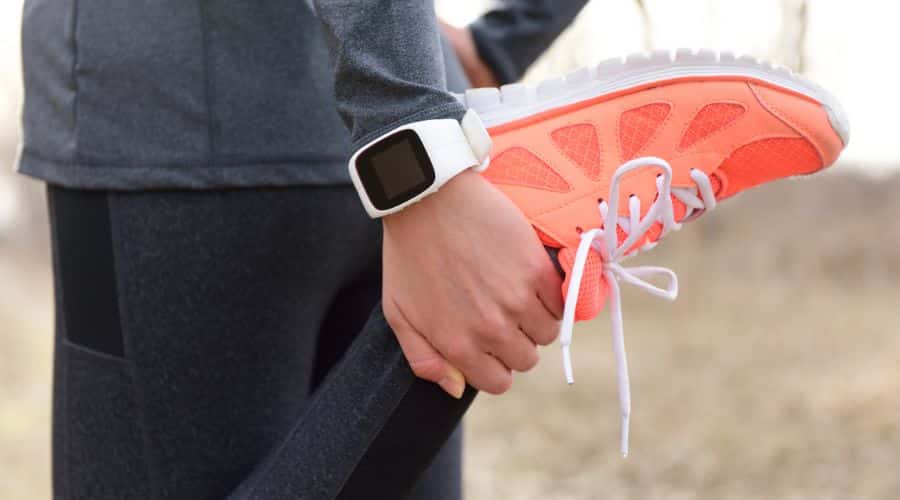Running is a great way to stay in shape, but it’s important to make sure your body is ready for the exercise. Taking time to prepare your muscles and joints before running can help prevent injuries and ensure you get the most out of your workout.
By doing some simple stretches, warming up with low-intensity exercises, and focusing on proper form, you can make sure your body is always ready for a run. This preparation will not only help improve performance but also reduce stress on joints which can lead to long-term health benefits. With the right preparation, running can be an enjoyable and rewarding activity.
In this blog, we will give you five tips to help you in preventing injury when running. It is frustrating to have to take a break from running or if the pain keeps you from running at your best, so here are some things you can be doing to prevent or reduce the chances of getting hurt when running.
5 Things You Can Do To Prevent Injury When Running
1. Warm Up Properly
It is important for runners to take the time to warm up properly prior to a running session. A proper warm-up will increase blood flow and raise the temperature of your muscles, preparing them for the upcoming workout and reducing the risk of injury.
During a warm-up, it is important to perform dynamic stretching exercises that focus on the specific muscles used while running. This allows these muscles to become more flexible and responsive, which can improve performance and reduce fatigue.
Additionally, a proper warm-up helps boost your heart rate gradually instead of suddenly jolting it into high intensity exercise right away. Taking time to properly warm up before running can help prevent injuries, increase performance and make every run more enjoyable.
2. Wear Appropriate Shoes
Running is an intense physical activity that requires the right gear to get the most out of your workout. Wearing comfortable shoes is one of the most important things you need to consider when starting a running routine.
Properly fitted and comfortable running shoes will help reduce impact on joints, provide support for feet, ankles, and knees, and help improve performance by allowing a smoother stride. Injuries when running can be caused by the fit of a shoe and the lack of support they might have.
Moreover, wearing uncomfortable shoes can lead to blisters, bruises or pain in your feet that can make it difficult to keep up with your running goals. Therefore, investing in good quality running shoes is key to achieving optimal results when running.
3. Increase Intensity Gradually
Increasing intensity gradually when running is extremely important in order to avoid injury and maximize the benefits of your workout. When starting a new exercise routine, it’s essential to set realistic goals and increase intensity gradually over time.
Allowing your body to get used to the increased load can help reduce the risk of muscle strain or other injuries. Gradually increasing intensity also helps build endurance and strength, letting you reach your desired fitness level safely and efficiently.
Overall, building up to higher levels of physical activity can improve both short-term and long-term health outcomes. Therefore, always remember to start slow and increase intensity incrementally as you go!
4. Stay Hydrated
Staying hydrated when running is essential for maintaining performance and avoiding heat-related illnesses. Dehydration can lead to a decrease in endurance, increased heart rate, and impaired coordination.
It can also cause fatigue, mental confusion, dizziness, and cramps. It is important to drink enough fluids throughout the day before and after a run session to help prevent dehydration.
Additionally, drinking small amounts of water during exercise can help replenish lost fluids while running without causing digestive discomfort or cramping.
Once you’ve finished your run session, it is important to continue hydrating with electrolytes or a sports drink for optimal recovery. Staying properly hydrated when running is key for successful workouts and long-term health benefits!
5. Listen to Your Body
Listening to your body is essential when running. Your body knows when it needs rest and can provide feedback on how fast, far and long you should be running. Running too hard for too long can lead to overtraining, injury or burnout.
Paying attention to how your body is feeling before, during and after a run, as well as getting enough rest days in between runs will help ensure that you stay healthy while still enjoying the benefits of exercise.
Listening to your body can also help prevent common running-related injuries such as shin splints, plantar fasciitis and runner’s knee while helping you maintain optimal performance levels. Learning how to listen to your body is the best way to achieve success in any running program.
Keep Yourself Running and Do These 5 Things To Stay Healthy This Spring
Properly preparing your body before running is essential to have the best experience and reduce risk of injury. Spending a few minutes stretching, warming up, and cooling down can help you be in peak physical condition when running.
This preparation will also help increase flexibility and strength which helps improve performance.
Additionally, foam rolling after your run helps decrease recovery time between runs by increasing circulation and decreasing muscle tension.
Taking the time to properly prepare your body for a run is an important step that should not be overlooked. Doing so will help ensure that you are able to get the most out of each run safely and effectively.
Are you experiencing pain when running or want more information about preventing injury when running?
If you are struggling with pain when running or have questions about prevention of injuries when running, but feel that you don’t know where to start, feel free to schedule a free phone consult or contact us to arrange a free running injury assessment. You can also feel free to give us a call at 920.335.7227 (We still like to talk on the phone!)
We also have many more videos related to staying active and tips on helping you stay pain-free on our YouTube channel.
If you want more information on running and how to maximize your potential when running, visit us or check out this free report to help you prepare for your next run!
Don’t let pain or injury concerns keep you from what you love to do!
We love to keep people in Appleton mobile, active, and off pain pills – let our expertise go to work for you to help you return to the activities you love.
Don’t forget, you can schedule a no-obligation (and free!) phone consult or visit us at our Appleton clinic as part of your free running injury assessment. Or just give us a call at 920.335.7227.
Until next time,
Eric Wallace, PT

